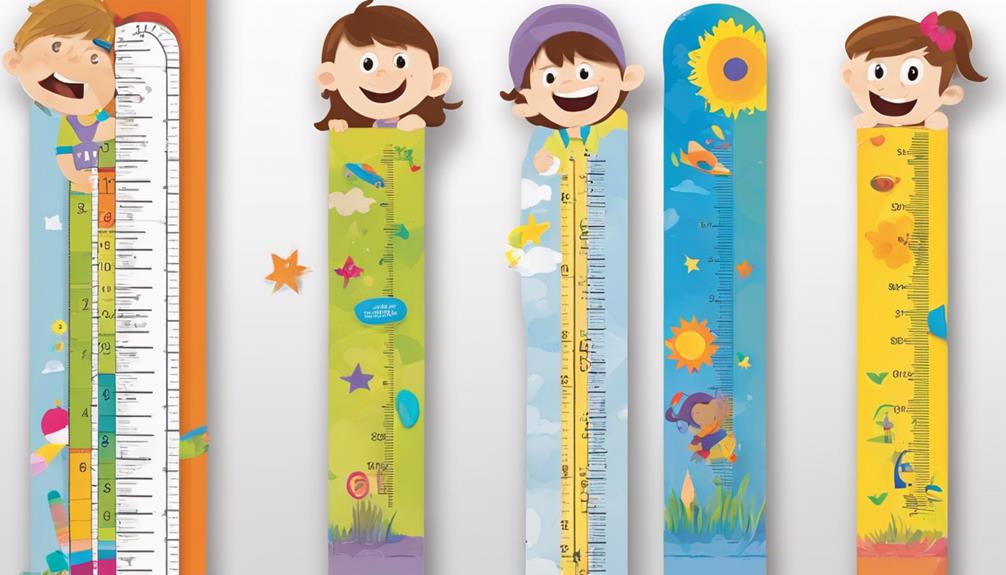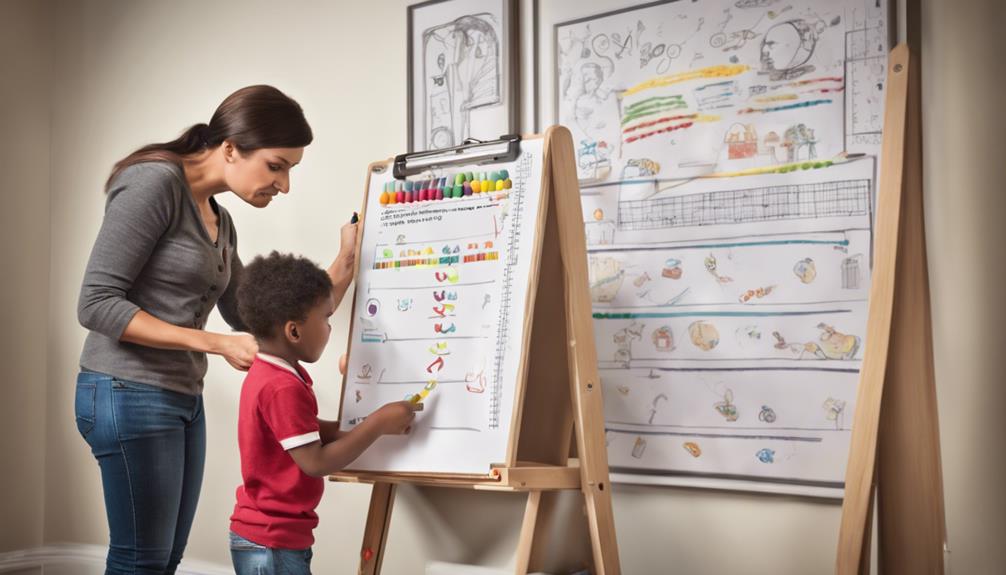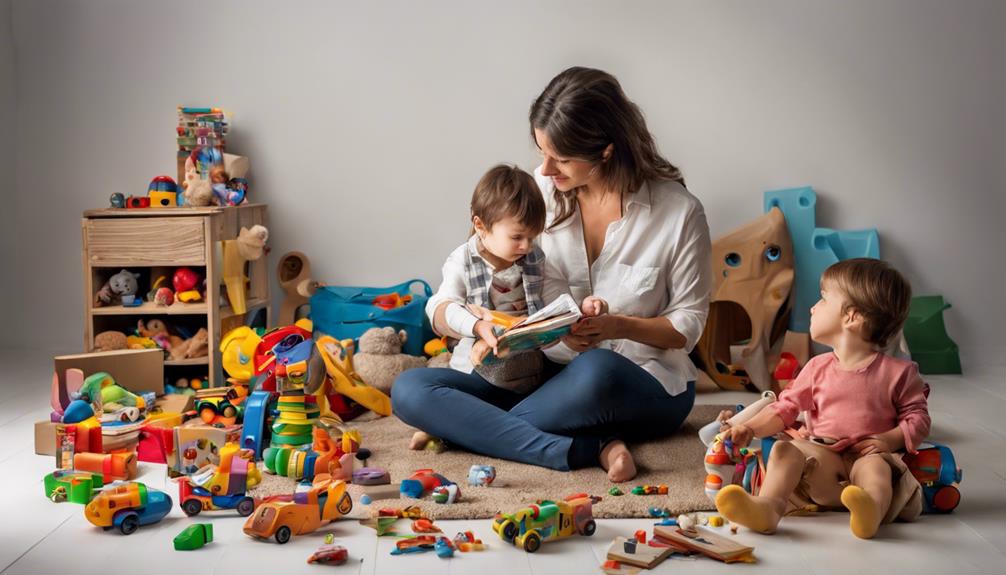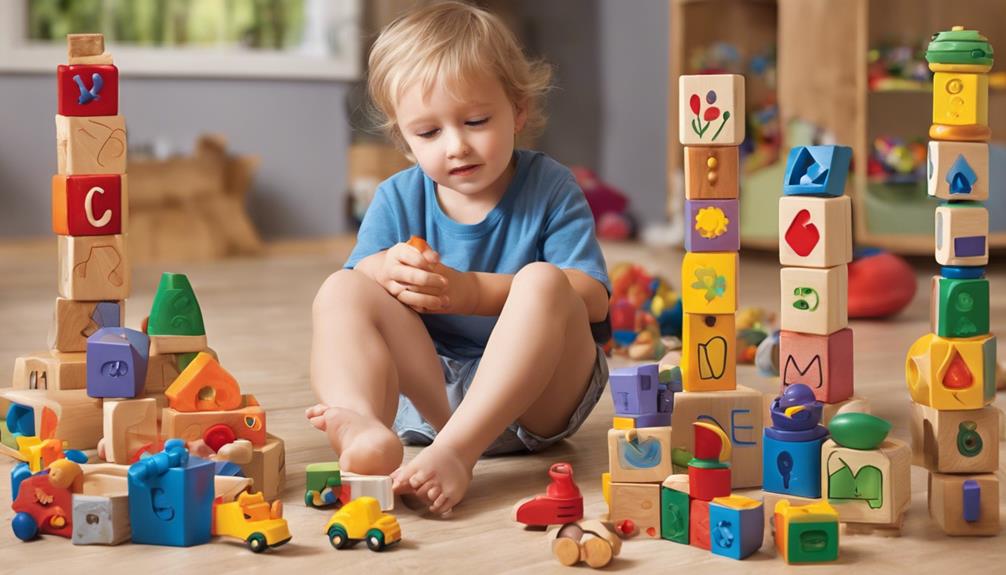How can we ensure that **our child** is hitting crucial development goals? With the help of some key tips and guidance, **parents** can support **their child’s** growth and progress every step of the way. Stay tuned to discover the secrets to promoting healthy developmental milestones effectively. Continue reading to unlock the best ways to support your child’s growth and ensure they are on the right path to success.
While it may seem like a challenging task, there are effective ways to track and support their growth.
By staying informed on key developmental markers, utilizing available tools, and collaborating with professionals, we can create a complete approach to monitoring our child's progress.
But what specific strategies can we employ to make sure we are effectively supporting our child's development?
Key Takeaways
- Use CDC Milestone Tracker App for regular monitoring.
- Engage parents, grandparents, and caregivers in observation.
- Establish a collaborative support team for comprehensive monitoring.
- Utilize standardized tools like ASQ for early detection.

GPS Tracker for Kids hidden 4pack, Security Tag with Pins Works with Find My (iOS only), Lost Mode, Anti-Removal Tracking Device for Children, Elderly, Pets, Backpack, No Monthly fee (Not for Android)
No Monthly Fees & Works with Apple Find My: UTag is a reliable gps tracker for kids that…
As an affiliate, we earn on qualifying purchases.
As an affiliate, we earn on qualifying purchases.
Importance of Developmental Monitoring
Developmental monitoring plays an important role in ensuring early detection and support for children with developmental disabilities, impacting their long-term outcomes greatly.
By engaging in regular monitoring, parents and caregivers can track a child's developmental progress, allowing for early identification of any issues that may arise. This proactive approach can lead to better outcomes for children with developmental disabilities, as interventions can be implemented sooner rather than later.
Additionally, increased awareness of developmental milestones not only benefits the child's health and well-being but also helps create ideal learning environments tailored to their specific needs.

Baby Tracking Journal (Girl Edition) – HARDCOVER Baby Diary for Newborns, Daily Activity Log, Developmental Milestones, Immunization Schedule, Health Record, Emergency Contacts, and More! – Made by Doctors for
Made by doctors for new mothers. Each page is specifically designed to help keep track of the most…
As an affiliate, we earn on qualifying purchases.
As an affiliate, we earn on qualifying purchases.
Tools for Tracking Developmental Milestones

When it comes to monitoring your child's development, having access to reliable tools for tracking developmental milestones is essential. Utilizing these tools can help you stay informed about your child's progress and detect any potential delays early on.
Here are some key points to take into account when tracking your child's developmental milestones:
- Use the CDC Milestone Tracker App: This app provides a valuable resource for monitoring and tracking your child's developmental milestones.
- Check for Typical Milestones: Keep an eye on your child's playing, learning, speaking, behaving, and moving abilities to make sure they're meeting typical milestones.
- Involve Parents and Caregivers: Engaging parents, grandparents, and caregivers in the monitoring process can offer a thorough view of your child's development.
- Consult with Your Child's Doctor: If you have any concerns about your child's milestones, discussing them with your doctor can lead to further evaluation and early intervention if necessary.

GARVALON Early Screening Kids Snellen Chart Wall Eye Test Chart Classroom Tool
Standards: testing norms, providing a trustworthy tool for accurate assessment
As an affiliate, we earn on qualifying purchases.
As an affiliate, we earn on qualifying purchases.
Team Approach for Child Development Support

To best support your child's development, establishing a collaborative team comprising pediatricians, teachers, and professionals is valuable. This support team plays an important role in monitoring your child's progress, identifying any areas of concern, and providing early interventions when needed.
Effective communication within the support team is vital to make sure that everyone involved is on the same page regarding your child's development. By sharing information between parents and professionals, you can gain a thorough understanding of your child's strengths and the areas that may require additional support.
Working closely with pediatricians allows for medical insights, while teachers can provide valuable educational perspectives. Professionals such as therapists or developmental specialists can offer targeted interventions tailored to your child's specific needs.
Celebrating milestones together as a team reinforces the progress made and encourages continued growth.

Early Childhood Assessment & Documentation Framework (Ages 2–4): A Structured Developmental Monitoring System for Educators and Early Learning Programs
As an affiliate, we earn on qualifying purchases.
As an affiliate, we earn on qualifying purchases.
Parent's Role in Developmental Monitoring

As parents, our role in monitoring our child's development is essential for recognizing and addressing any potential concerns early on. Here are some ways we can actively participate in this important process:
- Observing Milestones: We need to observe our child's progress in various areas such as playing, learning, speaking, behaving, and moving.
- Seeking Diverse Perspectives: Involving grandparents, caregivers, and teachers can provide valuable insights into our child's development from different viewpoints.
- Using Standardized Questionnaires: Tools like ASQ, PEDS, and M-CHAT can help us assess different developmental domains systematically.
- Ensuring Regular Monitoring: It's important to monitor our child's development consistently at every well-child visit to catch any signs of developmental delays or disabilities early on.
Strategies for Effective Developmental Evaluation

Utilizing standardized screening tools such as ASQ, PEDS, and M-CHAT is essential for effectively evaluating various domains of a child's development. These tools, recommended by the American Academy of Pediatrics (AAP), help assess language, movement, thinking, behavior, and emotions. By involving parents, grandparents, and caregivers in the developmental screening process, a complete picture of the child's growth can be obtained over time. These screenings can also identify the need for specialist evaluation, ensuring that any potential developmental disabilities are addressed promptly. Early detection through developmental screening is critical, as approximately 1 in 6 children in the US have developmental disabilities. By following AAP recommendations and actively participating in the evaluation process, parents can play a crucial role in promoting their child's best development.
| Developmental Screening Tools | Purpose | Benefits |
|---|---|---|
| ASQ | Assess various developmental areas | Early identification of delays |
| PEDS | Focus on behavioral and developmental concerns | Tailored intervention plans |
| M-CHAT | Screen for autism spectrum disorders | Early intervention for better outcomes |
Frequently Asked Questions
How Do I Check My Child's Development?
We watch for signs of healthy growth in our child by observing play, learning, speech, behavior, and movement. Involving family and caregivers helps us track milestones. If there are concerns like delays, we consult the doctor for guidance.
How Do We Measure the Development of the Child?
We measure our child's development by observing milestones in language, movement, behavior, and thinking. Regular monitoring using checklists and screenings like ASQ and M-CHAT helps us track progress. Early detection is vital, as 1 in 6 children in the US have developmental disabilities.
How Can Growth and Development Be Monitored in Children?
Monitoring our child's growth involves tracking milestones in play, learning, speech, behavior, and movement. Engaging caregivers helps gain a holistic view. Using tools like ASQ, PEDS, and M-CHAT aids in early issue detection. Healthcare providers, vital in assessments, guide us through this journey.
How Do You Assess a Child's Development?
In our journey of evaluating a child's development, we explore milestones in playing, learning, speaking, behaving, and moving. By involving caregivers and utilizing tools like ASQ and PEDS, we guarantee every step is thoughtful and thorough.
What Are the Key Developmental Milestones to Monitor in My Child’s Growth?
Monitoring child’s growth milestones is crucial for parents to track their child’s development. Key milestones to watch for include motor skills, language development, social interactions, and cognitive abilities. By understanding these milestones, parents can identify any potential developmental delays and seek early interventions if needed.
Conclusion
To sum up, monitoring our child's development is crucial for their overall well-being. While some may feel overwhelmed by the process, remember that we aren't alone in this journey.
By utilizing the available tools and resources, working with healthcare providers, and seeking support from our community, we can navigate any challenges that may arise with confidence and determination.
Let's continue to prioritize our child's development and guarantee they reach their full potential.









